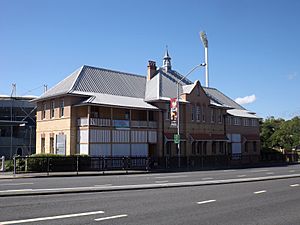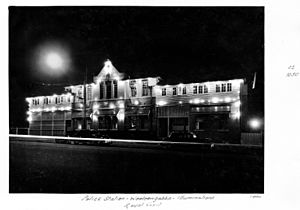Woolloongabba Police Station facts for kids
Quick facts for kids Woolloongabba Police Station |
|
|---|---|

View from Main Road, 2015
|
|
| Location | 842-848 Main Street, Woolloongabba, City of Brisbane, Queensland, Australia |
| Design period | 1900–1914 (early 20th century) |
| Built | 1913–1936 |
| Architect | Queensland Department of Public Works |
| Architectural style(s) | Classicism |
| Official name: Woolloongabba Police Station (former), South Coast District Headquarters, Woolloongabba Police Station | |
| Type | state heritage (built) |
| Designated | 25 November 1994 |
| Reference no. | 601382 |
| Significant period | 1910s, 1930s (historical) 1913–1930s (fabric) 1913–1993 (social) |
| Significant components | police station, barracks - police, office/s |
| Lua error in Module:Location_map at line 420: attempt to index field 'wikibase' (a nil value). | |
The Woolloongabba Police Station is an old police station in Woolloongabba, Brisbane, Queensland, Australia. It was designed by the Queensland Department of Public Works and built between 1913 and 1936. This building is important because of its history and design, and it is listed on the Queensland Heritage Register.
Contents
History of the Police Station
Early Police Stations in Woolloongabba
The first police station in Woolloongabba opened in a rented house on Stanley Street. As more people moved to Woolloongabba and nearby areas, the station became too small. So, in 1888, the police moved to another rented house on Ipswich Road. They built a small holding room, called a lock-up, in the yard. Two years later, they used the house next door for police officers to live in.
Building a New Police Station
By 1910, the police station needed more space again. The government decided to build a brand new station. They chose a spot on Main Street that was part of the Woolloongabba Park Reserve. This meant they didn't have to buy new land. The design for the new building was ready in 1911, and it was finished and opened in 1913. It cost £4,539 to build.
How Police Stations Were Designed
The Woolloongabba Police Station was one of several large, two-story police buildings built in Queensland around this time. Other similar stations were built in places like Warwick (1901), Maryborough (1907), and Cairns (1912). These stations usually had two main parts: a two-story home for the senior police officer and a connected two-story building for the other police officers, which included a dayroom and a mess hall.
The dayroom was the main area for police work. Back then, police officers mostly patrolled on foot. They worked in three eight-hour shifts, 24 hours a day. So, the station's main job was to provide a place for officers to live and rest. The Woolloongabba station also had four holding cells in the basement.
Upgrades and Changes
In 1925, electric lights were put into the station. The next year, in 1926, it was connected to the sewage system. A dining room for the police officers was added in 1928.
Becoming a District Headquarters
By 1934, a main office, or "Headquarters," was needed for the South Coast Police District. This district covered a very large area, about 2060 square miles. Woolloongabba was chosen as the best location because it was central, especially with the new Story Bridge expected to open soon. It also had empty land for future growth.
To become the Headquarters, the station needed more office space. The Senior Sergeant moved out of his living quarters in October 1934 so those rooms could be used as offices.
Major Additions in the 1930s
Big additions were made to the station in 1936 and finished in 1937, costing £9,555. These changes included adding sections to the north and south ends of the main building. A new three-story brick building was also built behind the original one, connected by walkways on each floor. This new building provided more living and recreation areas for the police. A brick garage was also built.
Helping People During Hard Times
During the 1930s, there was a lot of unemployment. The government started programs to help people find work, called "relief work." The new Headquarters needed a room for police to help manage this program. When the additions were finished in 1937, rooms in the basement were set up as a Relief Office, with space for records and a public counter. An assembly yard was also created for the relief workers.
The South Coast District Headquarters officially moved into the Woolloongabba station in September 1937.
Community and Recreation
In 1938, a park and playground were built next to the police station. This area, covering about two and a half acres, was suggested by the Police Welfare Club. It included three tennis courts, changing rooms, and a "children's sanctuary" where kids could play safely. A basketball court was added in 1939.
By 1939, the relief work programs were slowly ending. The Relief Office at the station was then used for storing records.
Changing Roles of the Building
The building stopped being used as a place for police officers to live in early 1951. Also in 1951, the Criminal Investigation Branch (CIB), which investigates crimes, moved into the building. By 1954, the building was mostly used for offices instead of homes. In 1964, the police stations in Kangaroo Point and East Brisbane closed, and their areas became part of the Woolloongabba Police Division.
More changes were made in 1967. The southern end of the front building was extended, and the walkway connecting the 1913 and 1937 buildings was made larger to add more offices.
The playground and basketball court are no longer there. The tennis courts were removed in 1993 and replaced with cricket practice nets. The police moved out of the station in July 1993.
After the police left, the building was used by the state Department of National Parks, Recreation, Sport and Racing and was called "Sports House."
What the Building Looks Like
The former Woolloongabba Police Station has two main parts. The front building, facing Main Street, has two stories and a basement. Behind it is a three-story building, connected by a two-story walkway above the service yard.
The front building has a metal roof and a decorative spire. It has a central section that sticks out, with windows on both floors. The lower part is made of dark brick, and the upper part is lighter brick with a smooth, rendered finish. The sides of the building used to be open verandahs but have been closed in with windows.
The back of the building also has enclosed verandahs. The walkway connecting the two buildings is made of weatherboard and has windows. The three-story building at the back is made of face brick and has a metal roof.
Inside, you can see the different parts of the building that were added over time. Some original features, like a five-paneled timber door, still remain. The basement has the old Relief Office, a laundry, and four holding cells with steel doors.
Why it's a Heritage Site
The former Woolloongabba Police Station was added to the Queensland Heritage Register on 25 November 1994. This means it's considered an important historical place for several reasons:
Showing Queensland's History
The building shows how Woolloongabba grew and developed. It was the first police station built specifically for the area. Its choice as the Headquarters for the South Coast Police District also shows how the southern suburbs of Brisbane grew from the 1930s onwards.
Showing How Police Stations Changed
The building clearly shows how the role of police and police stations changed over time. It started mainly as a place for police officers to live, and then it became a bigger office for police operations.
Its Beautiful Design
The old station stands out on Main Street. It's a fine example of public architecture with a strong, official look. The way the roof is designed and the materials used, along with how the back building fits with the original one, show good design and craftsmanship.
Its Connection to the Community
The building also has social value because it was used as an office and meeting place for "relief work" during the 1930s. This program helped people find jobs during a difficult time.
Images for kids
 | Roy Wilkins |
 | John Lewis |
 | Linda Carol Brown |



